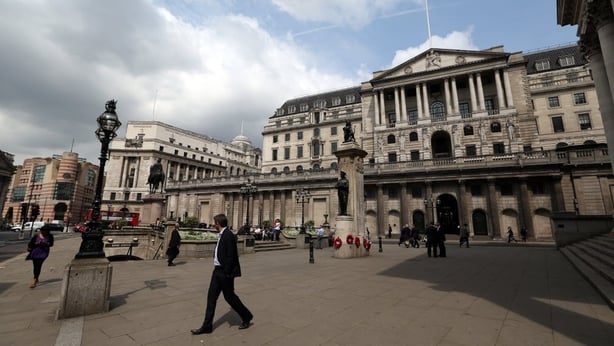Now is not the time to raise interest rates, Bank of England Governor Mark Carney said today.
The Bank of England chief warned that already weak wage growth risked a further loss of momentum as Britain prepares to leave the European Union.
He made his comments in a speech to London's banking community a day after Brexit talks started.
Mark Carney dashed any prospect that he might be close to joining the three Bank of England policymakers who last week unexpectedly voted to raise rates from their record low of 0.25%.
The dollar gained more than a cent against the pound after the comments, sending sterling to a two-month low against the greenback of $1.2603,
The Bank of England is juggling the tricky combination of rising prices caused in large part by the fall in the value of the pound since the June 2016 vote to leave the bloc, and slowing wage growth as the economy loses much of last year's impetus.
The uncertain outcome of the Brexit talks is also expected to weigh on consumers and companies.
UK finance minister Philip Hammond told the same Mansion House audience that it was important to avoid a "cliff edge" when Britain quits the EU in 2019 and to have a transitional deal on trade before a full agreement is reached.
Carney said that if there was insufficient progress on this, businesses in Britain and other EU countries might soon start to activate their own Brexit contingency plans.
"Before long, we will all begin to find out the extent to which Brexit is a gentle stroll along a smooth path to a land of cake and consumption," he said.
"Monetary policy cannot prevent the weaker real income growth likely to accompany the transition to new trading arrangements with the EU," he added.
Before becoming Britain's foreign minister, Boris Johnson had dismissed the idea of trade-offs in the EU divorce process by saying his "policy on cake is pro having it and pro eating it".

Sterling dropped more than 10% after last summer's referendum vote, which Carney said reflected financial markets' dim view of Brexit's likely effect on the economy.
Sterling's weakness been a factor in consumer price inflation reaching its highest in nearly four years, contributing to a slowdown in consumer spending and lacklustre first-quarter growth.
Carney's concerns about the economic impact of Brexit added to "mixed signals" on consumer spending and business investment, as well as wage growth that remained "anaemic" even with unemployment at its lowest for more than 40 years.
A rate rise was not yet appropriate, Carney said. "Now is not yet the time to begin that adjustment," he said.
"In the coming months, I would like to see the extent to which weaker consumption growth is offset by other components of demand, whether wages begin to firm, and more generally, how the economy reacts to the reality of Brexit negotiations," he said.
Carney underlined the importance of free trade - especially in financial services - and said the EU it would face greater costs if it tried to remove activities such as clearing euro-denominated derivatives from London.
He also said that whether Britain's large current account deficit was sustainable remained an open question, "one whose answer depends crucially on the outcome of the Brexit negotiations".
Carney warns EU against splitting euro clearing market
Meanwhile, Mark Carney also said today that splitting Europe's market for clearing euro-denominated derivatives would bump up costs for users and do little to improve financial stability.
Regulators should instead work with each other to forge a new form of cross-border supervision of clearing houses, Carney said.
"Fragmentation is in no one's economic interest. Nor is it necessary for financial stability. Indeed it can damage it," Carney said in today's speech in London's Mansion House.
Last week the European Union's executive European Commission proposed giving itself powers to move euro clearing business away from London after Britain leaves the bloc in 2019.
It said such powers might be needed to maintain financial stability in the EU given that the bulk of euro clearing takes place in London, where it is regulated by the Bank of England.

Carney said fragmentation of such global markets by jurisdiction or currency would reduce the benefits of central clearing, which ensures the safe completion of a trade.
Instead of forced relocation, authorities "can and should build on current models to develop a new form of regulatory and supervisory cooperation," Carney said.
"The European Commission's proposals announced last week recognise the importance of effective cooperation arrangements between the relevant EU authorities and their overseas counterparts," the Bank of England Governor aid.
"The bank welcomes this," he added.

